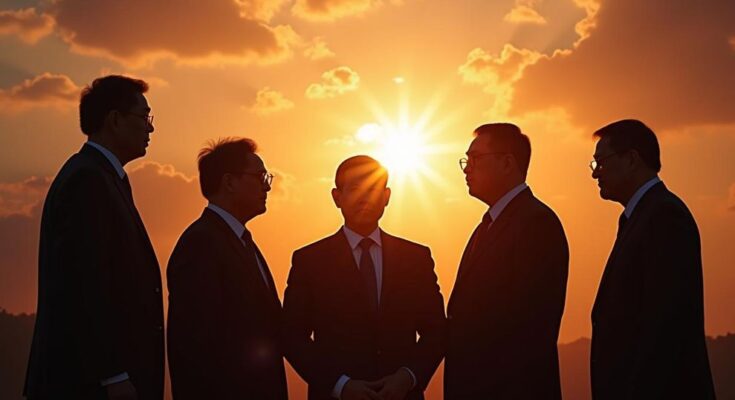Southeast Asian leaders met in Vientiane for the ASEAN summit, focusing on the Myanmar civil war and South China Sea tensions. The summit will also involve discussions with major global powers such as China, the U.S., and Russia, highlighting the region’s geopolitical significance. The presence of new national leaders and U.S.-China relations will shape discussions, with concerns regarding the slow progress on a code of conduct in the South China Sea and the response to Myanmar’s ongoing crisis.
Leaders from Southeast Asia convened in Vientiane, Laos, for the ASEAN summit, where they intend to address pressing issues, particularly the ongoing civil conflict in Myanmar and escalating disputes in the South China Sea. These two matters pose significant challenges to the regional bloc’s credibility and efficacy. Additionally, the summit will host discussions with global powers, including China, the United States, and Russia, all vying for influence in the region. The gathering is noteworthy not only for its timing but also due to its potential to address broader global issues, including rising violence in the Middle East, despite Southeast Asia experiencing only indirect repercussions from these events. Historically, ASEAN’s influence has been constrained, yet this forum has served as a crucial dialogue platform for superpowers seeking engagement with Southeast Asia. The ten ASEAN members—Indonesia, Thailand, Singapore, the Philippines, Vietnam, Malaysia, Myanmar, Cambodia, Brunei, and Laos—are also set to engage with dialogue partners from Japan, South Korea, India, and Australia on various subjects, from economic collaboration to climate change. During the opening remarks, Lao Prime Minister Sonexay Siphandone acknowledged the presence of new leaders from Thailand and Singapore, emphasizing Laos’ role as chair in facilitating cooperation among member states to mitigate geopolitical and economic hurdles. “We help one another, and work together the ASEAN way,” said Prime Minister Siphandone. The summit features the participation of various leaders, including Thailand’s new Prime Minister Paetongtarn Shinawatra and Singapore’s Prime Minister Lawrence Wong. Notably, President Joko Widodo of Indonesia is absent, delegating Vice President Ma’ruf Amin to represent him. US Secretary of State Antony Blinken will attend in lieu of President Biden, and China will be represented by Premier Li Qiang. Tensions between the U.S. and China, particularly concerning China’s assertiveness in the South China Sea, will be a central topic of discussion. According to Dan Kritenbrink, a senior U.S. diplomat, there is a likelihood of multiple China-related issues arising during the ASEAN meetings. “A number of (China)-related issues are likely to come up in the context of the ASEAN meetings,” Kritenbrink stated. ASEAN members, including Vietnam, the Philippines, Malaysia, and Brunei, have overlapping territorial claims with China, which asserts control over the majority of the South China Sea. Efforts toward a non-binding code of conduct for the region have progressed slowly as disputes continue to arise. The situation in Myanmar, which has witnessed extensive violence and instability since the military coup in February 2021, also remains critical. Despite the junta’s acceptance of an ASEAN peace plan promoting ceasefire and mediation, genuine adherence has been lacking, complicating the peace process. Thailand is set to host an informal consultation regarding Myanmar’s situation in December, although its outcome remains uncertain. The inclusion of Myanmar’s Foreign Ministry permanent secretary Aung Kyaw Moe at this summit marks the first high-level representation since 2021 when political representatives were barred. This move has been perceived by some as ASEAN’s compromise regarding the Myanmar crisis, suggesting the organization’s diminishing resolve in addressing the ongoing conflict.
The current ASEAN summit in Laos highlights the ongoing geopolitical challenges confronting Southeast Asia, specifically the civil unrest in Myanmar and territorial disagreements in the South China Sea. Myanmar’s military junta continues to struggle with various pro-democracy factions, leading to humanitarian crises with significant civilian casualties. Simultaneously, escalating tensions in the South China Sea, where China has been increasingly assertive, complicate regional stability and ASEAN’s role in mediating these disputes. Furthermore, the summit’s timing coincides with heightened global tensions, especially involving major players like the United States and China, who are engaged in a rivalry for supremacy in the region.
The ASEAN summit in Vientiane serves as a critical platform for Southeast Asian leaders to confront significant regional challenges, namely the Myanmar crisis and South China Sea disputes. Despite ASEAN’s historical limitations in enforcing influence, the involvement of global powers underscores the geopolitical significance of this gathering. Leaders are poised to discuss cooperative efforts while acknowledging the complexities presented by their national interests, particularly regarding relations with China. As negotiations move forward, the prospects for substantial breakthroughs remain uncertain, necessitating continued dialogue and commitment among ASEAN members and their partners.
Original Source: www.arabnews.com




